Diversity, Equality and Inclusion

GRI 103-2 | 103-3 | G4-DMA


Banco do Brasil Foundation speaks to different audiences and carries out actions that seek to promote the improvement of the quality of life of all Brazilians, without any distinction.
Highlighted, some initiatives and projects supported during the year 2020 that demonstrate the performance in the themes of diversity, equality and inclusion.

BB Foundation promotes debate on women empowerment

On the international women's day, the BB Foundation held a debate on women empowerment. Marina Schneider, from the startup EuCarbono and Kátia Ferreira, from Proeza Institute, participated in the event and told a little about their trajectory.
Marina highlighted how she started to think about conscious consumption. "One fine day I was driving my car and a question came to me: why is the automaker punished for emitting these gases into nature and whoever drives does not receive punishment?" It was this question that motivated adwoman Marina Schneider to think of an alternative that would combine nature and consumption.
The solution found was the creation of EuCarbono: a platform for marketing products and services from companies committed to the environment, which causes the least negative impact on the planet. In addition, 10% of the company's profit is invested in environmental recovery projects.
Katia Ferreira became aware of the problems that women face after she started teaching sewing and embroidery classes. In the face of domestic violence, abandonment, lack of employment, the social entrepreneur began to develop actions to generate income for women and thus they could break the cycle of violence and social exclusion.
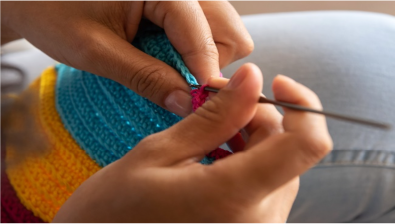
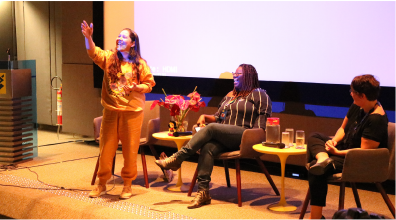
“With them I learned my vocation, which was not to sew or the embroidering, but to tell each one of them that they had the capacity, that they could change their lives”, says Kátia.
In 2003, Kátia created Proeza Institute to support women in situations of social vulnerability and, since 2018, BB Foundation has supported one of the works developed by the entity, the project "Reuso de Resíduo Têxtil e Produção Comunitária de Pães e Alimentos" (Reuse of Textile Waste and Community Production of Bread and Food) in the administrative region of Recanto das Emas/DF located 25 kilometers from Brasília.
In 17 years, Proeza has trained more than 2,000 women and serves 268 families daily.
Sis at work: they show that construction is also a women's talk
Feminine grandeur reigns in the homes. Most of them are women who take care of the house, cleaning, meals, taking care of the children and, still, working outside. What if, in addition to all this, they also commanded the works and renovations of their spaces? It is the proposal that Arquitetura na Periferia (Architecture in the Peripheries), of the Instituto de Assessoria a Mulheres e Inovação - IAMÍ (Institute of Assistance to Women and Innovation), from Belo Horizonte (MG) was one of the finalists in the Sustainable Cities and/or Digital Innovation category of the Banco do Brasil Foundation Award for Social Technology 2019 The initiative won the 2nd place and received BRL 30 thousand for the methodology, in addition to the Social Technology certification.
“It is social recognition, we are pleased to understand that our method is a technology that can be reapplied. Above all, certification is important, as it conveys reliability in our work and allows us to invest in partnerships, notices and new projects. And the financial incentive helped to build in the first months of 2020, helped to maintain administrative activities and organize us to continue the project”, says Mari Borel, architect of the Arquitetura na Periferia (Architecture in the Peripheries) initiative.
The Arquitetura na Periferia (Architecture in the Peripheries) project gathers and trains women for independence in installing, renovating and building their own home. The group works to provide technical assistance to groups of women from the peripheries through a process in which they are introduced to the practices and techniques of project and construction planning, and receive microfinance so that they can carry out the reforms of their communities with autonomy and without waste.
Making a difference in the lives of women since 2014, the methodology served 61 women, and had 300 people directly impacted.
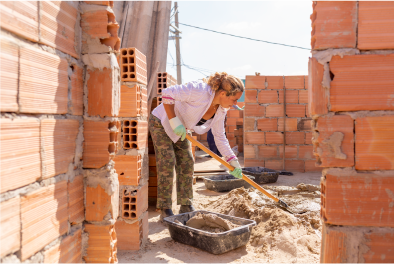
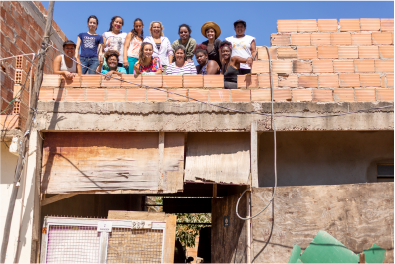

Youth insertion in digital economy
The Projeto Inserção Juvenil na Economia Digital (Juvenile Insertion in Digital Economy Project), carried out by BB Foundation and Cesar School, was conceived with the purpose of preparing the young participants of AABB Comunidade (BB Athletic Associations Community) for the job market, with the expansion of the use of new information and communication technologies (ICTs) that favor the educational process of these people.
The initiative was divided into areas of coverage, with ten cities in the Northeast, eight cities in the South and one in the Midwest. Activities such as exploratory study, production of didactic material, training of educators and the reapplication of learning with students were developed in the AABBs in the Northeast.
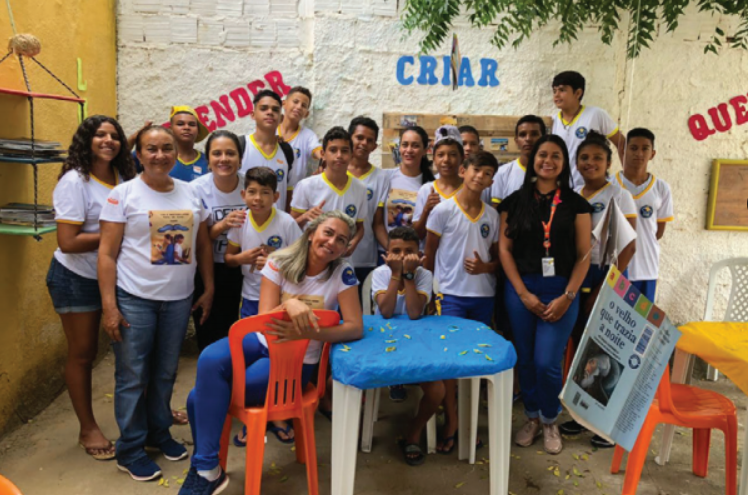
Marcela Cox, manager of educational projects at Cesar School, explained that the project provided distance learning courses linked to Digital Economy to educators. A board for solving real problems was also developed in the Ciclo do Empreendedor Titã - CET (Cycle of the Titan Entrepeneur). In this game, young people are introduced to situations mirrored by reality problems and are encouraged to seek solutions in a collaborative way. In a third moment, the Conexão Jovem e Mercado (Youth and Market Connection) worked with the students and educators.
Participants were presented with the main market requirements and the necessary tools for a good inclusion in the work environment and, from this context, participants were able to develop activities of digital entrepreneurship, audiovisual production, as well as socio-emotional skills.
One of the fruits of the activities is the Álbum de Titãs (Album of Titans), built from the social technology Conexão Jovem e Mercado (Youth and Market Connection). In this work, the potential of 480 young people from the ten northeastern cities that are members of the AABB Comunidade (AABB Community) was awakened. Álbum de Titãs (Album of Titans) aims to introduce participants to new connections to the job market and brings the professional objective, the courses taken, skills and contacts of young people.
The AABB Comunidade (AABB Community) program, which integrates family, school and community, provides school supplementation to children and adolescents from low-income families and aged between six and 18 years old.
VLibras: innovation and digital accessibility for Brazilian Sign Language
Some everyday tasks, such as accessing a website, may not be a problem for a portion of society, but for the hearing impaired they are not so simple. And, to change this scenario, the team from the Lavid Research and Extension Center, from the Computer Center of the Federal University of Paraíba (CI/UFPB) developed VLibras, an open, collaborative and innovative technological platform for digital inclusion that allows hearing impaired people to access digital content in their natural language in different contexts.
The development idea happened when the Center for Informatics at UFPB - Federal University of Paraíba received Hozana Raquel, the first deaf student at the Computer Science course, in 2009. At that time, UFPB did not have Libras interpreters hired to accompany her in class. The need to integrate Hozana into academic routines motivated researchers at the Digital Video Applications Laboratory (LAVID) to design a solution that could help them access material to study and the process of communicating with teachers. The project has evolved and with partnerships between UFPB, the Ministry of Economy (ME), Secretariat of Digital Government (SGD) and the National Research Network (RNP), Suíte VLibras has been continuously built and improved since 2011.
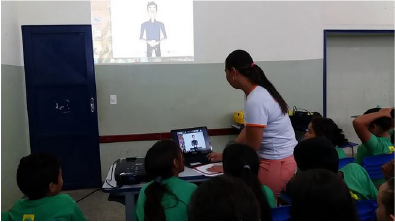
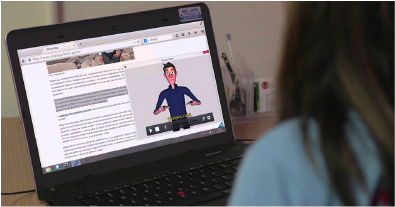
The open source platform is free and automatically translates digital content on various media (texts, audios and videos) into the Brazilian Sign Language (Libras) through a 3D Avatar, making computers, mobile devices and websites accessible to deaf people. The tool's components can be freely integrated into any digital content source. Its 3D dictionary is one of the largest of its kind in the world, with almost 17,000 signs.
Development coordinator of VLibras, Tiago Maritan points out that, currently, people with hearing impairment have a little more difficulty to access higher education courses and to have a better position in the job market. “This occurs mainly because there is no full accessibility, access to information suitable for them in all media. As the rest of the population is not proficient in Libras, they end up depending on human interpreters to communicate and access information. But this has improved over time. I have felt some advances in this with regard to awareness, public policies and new technologies that are gradually helping to eliminate these barriers”, he explains.
Acknowledgment
Certified in the Banco do Brasil Foundation Award for Social Technology 2019, the solution counts more than 200 thousand downloads, about 6 million daily accesses, and is used in 600 thousand pages on the web. “It is a project that makes us proud. Its motivation and purpose is a source of immediate empathy and permanent gratification for all deaf people, interpreters, linguists, students, teachers, researchers and other professionals who have had the opportunity to contribute to their development for all these years. The certification of VLibras as an active and useful social technology is a real prize for all of us”, highlights Tiago Maritan.
Integration and reference
VLibras is used daily in millions of accesses for all its components. It is natively integrated in all Federal Government websites, in addition to several other portals of public and private entities, such as the House of Representatives, Federal Senate, Regional Courts, City Halls, State Governments, among others. “We received frequent reports of initiatives and new academic work at universities throughout Brazil that are using VLibras so that their solutions, tools and new technologies are already available in an accessible way for the hearing impaired community. This makes us very proud and it is a nice recognition that our work is helping in some way”, says Tiago.
With its innovative strength, the project was also used as a reference in the ABNT 15610-3 specification, which defines the standard for transmission of content in Libras in the Brazilian Digital TV System.

Education for inclusion
Banco do Brasil Foundation and Magnus Institute [V3] signed a partnership for (Education for inclusion: a look at life), which aims to promote educational actions to develop skills and autonomy for visually impaired people through the use of the guide dog.
The initiative was designed to be developed in four stages: the socialization phase of the guide dog with socializing families for 12 months; dog training (when he returns to Magnus Institute to be trained and become able to be a guide dog); training new instructors and lectures and training to mobilize people to get involved with the guide dog cause.
For the representative of Magnus Institute, Thiago Pereira, the partnership is of great importance, as it combines the strength of a consolidated institution, such as BB Foundation, with the proactivity and dynamism of Magnus Institute. “The Foundation is an extremely serious institution and gives even more credibility to our work. Our wish is that we will be able to prosper more and more side by side”, completes Thiago.
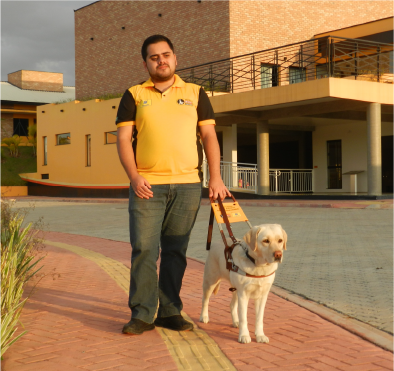
Along with the formalization, the guide dog donor area was released, with the objective of sensitizing people to become aware of the importance of training guide dogs in Brazil to facilitate the mobility of visually impaired people and raise funds for the cause.
In Brazil, there are approximately seven million people with visual impairment, according to IBGE data, and only 200 guide dogs in activity. Most of these animals received training at international institutions and the partnership between BB Foundation and the Magnus Institute are aimed to increase the number of dogs trained in the country and provide access to people with visual impairments.
